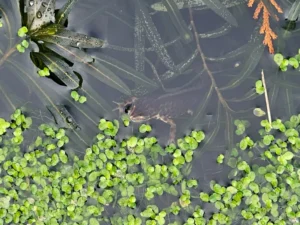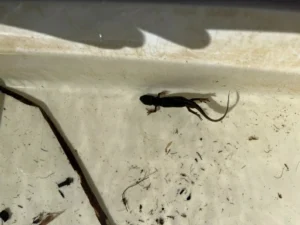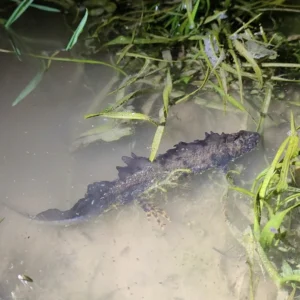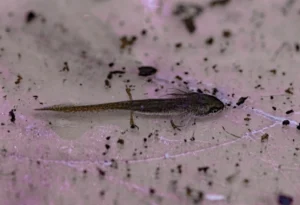When you come across newts in ponds, streams, or other water areas, you might notice how at home they look. So are newts freshwater animals?
Newts are freshwater animals. They live only in non-salty water like ponds, streams, lakes, and wetlands. They can’t survive in saltwater or brackish water because their skin and bodies are adapted for freshwater.
This need for freshwater affects where newts can live, how they spread across the world, and what habitats conservation efforts need to protect.
Why Newts Can’t Live in Saltwater
Newts have very permeable skin that lets water and substances pass through easily.

In saltwater, this would mess up their internal salt and water balance, which could cause dehydration or salt poisoning.
Their kidneys and other organs are built to handle the low salt levels in freshwater, not the high salt in the ocean.
Saltwater would quickly mess up their cells and could be fatal.
What Types of Freshwater Do Newts Prefer?
Newts do well in many freshwater habitats but usually prefer clean, well-oxygenated water at moderate temperatures.
Ponds with lots of plants are especially attractive to many species.
Slow-moving streams and shallow lake edges also provide good habitat, especially when there are hiding spots and enough prey.
Temporary rain-filled pools can support newts too, mostly for breeding since they may dry up in certain seasons.
How Water Quality Affects Newts
Clean water is very important for newt survival. Because their skin absorbs what’s around them, newts are very sensitive to pollution and chemicals.

Even small amounts of pesticides, fertilizers, or other chemicals can harm or kill them. Healthy newt populations often signal clean water.
Acidic water can also be a problem, though some species tolerate it better than others. Most newts prefer neutral to slightly alkaline water.
Do All Newts Use the Same Freshwater Habitats?
Different species like different types of water. Some prefer still water like ponds and lakes, while others like flowing streams or springs.
Mountain newts often live in cool, clear streams with lots of oxygen, while lowland newts may live in warmer, plant-filled ponds.
The European palmate newt, for example, can handle more acidic water than other species, so it can live in places other newts avoid.
How Seasonal Changes Affect Freshwater Use
During breeding, newts usually seek the best freshwater habitats, often returning to the same ponds or streams where they were born.
These sites need the right temperature, oxygen, and vegetation.
Outside breeding, newts may use temporary pools or drainage ditches if needed.
Water chemistry and physical features strongly affect where newts spend their time.
Can Newts Live in Artificial Freshwater?
Garden ponds and other man-made water areas can support newts if they meet basic needs. New ponds may need time to develop a stable ecosystem.
Chlorinated tap water is harmful and must be dechlorinated before use. Artificial ponds benefit from different depths, plants, and connections to land areas so newts can complete their life cycles.
Water Temperature and Newts
Being cold-blooded, newts are affected by water temperature. Cool spring-fed water may suit some species better than warm sun-heated ponds.

Temperature affects activity, breeding, and food availability. Very cold water slows them down, and very warm water may not have enough oxygen.
Most newts prefer 50-70°F (10-21°C), though they can handle slightly warmer or cooler water for short periods.
How Newts Find Good Freshwater
Newts use senses to locate suitable water. They can detect chemical cues, temperature changes, and the presence of other newts or prey.
Visual cues also help, they like areas with the right mix of open water and plants.
Many newts return to the same breeding sites year after year, showing they remember where good water is.
What Happens When Freshwater Dries Up?
If temporary water dries up, adults usually move to other water sources or hide on land until conditions improve.
Eggs and larvae are more at risk and may not survive if the water disappears too soon.
Changes in climate and rainfall make water availability less predictable, which is a challenge for newts.
How Water Quality Affects Reproduction
Good freshwater is very important during breeding. Eggs and larvae are sensitive to changes in water chemistry. Poor water can cause deformities or kill young newts.

Acidic water can stop eggs from developing, and polluted water may kill embryos or lower survival chances.
Even small chemical changes can affect breeding success.
Can Newts Help Water Quality?
Newts help freshwater health by eating mosquito larvae, midges, and other insects. This helps control insect populations.
They also indicate healthy water, seeing newts usually means the water is clean. But they mainly need clean water to survive and benefit more than they create it.
What Threatens Freshwater Newt Habitats?
Fertilizers and pesticides from farms are a big threat, even at low concentrations. Urban development can destroy or pollute habitats.
Climate change is also affecting rainfall and temperature, which can make some water areas unusable or dry up completely.
How to Create Newt-Friendly Freshwater
A garden pond with different depths, gentle slopes, and chemical-free water can provide good habitat. Native plants help establish a healthy ecosystem.
Avoid pesticides, fertilizers, and chemicals in areas that drain into the pond. Connect water sites to land areas so newts can move and complete their life cycles.
Do Different Life Stages Need Different Water?
Newt larvae need better water than adults because they can’t leave poor water. Adults can tolerate lower-quality water for short periods. Eggs are the most sensitive, needing specific chemistry and temperature.
How Water Availability Affects Distribution
Where newts live is mostly determined by freshwater availability and quality. You won’t find them where suitable water is missing or polluted.
Differences in water chemistry help explain why some species are found only in certain areas.
Human changes like dams, pollution, and water diversions have reduced or changed where newts can live.
Newts in Captivity
Captive newts need water that mimics their natural conditions. Temperature, pH, and no chlorine are very important.
Many breeding programs use aged, dechlorinated water and careful filtration. Regular water testing and gradual changes keep water quality stable for health and reproduction.
Conclusion
So yes, newts are freshwater animals. They depend completely on non-salty water for survival and reproduction.
Their bodies and life cycles make them fully reliant on clean freshwater, which also makes them vulnerable to pollution, habitat loss, and climate change
Hi, my name is Ezra Mushala, i have been interested animals all my life. I am the main author and editor here at snakeinformer.com.

